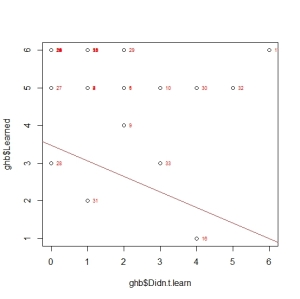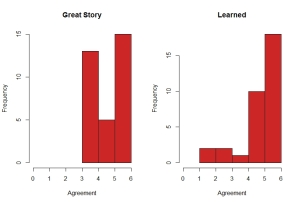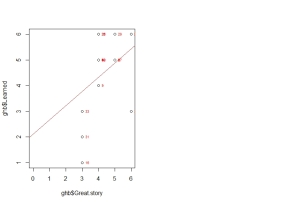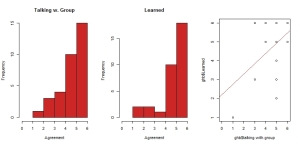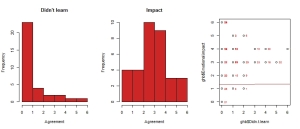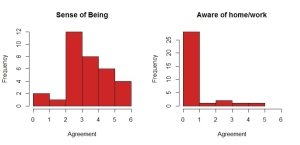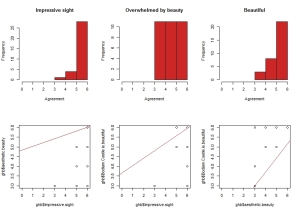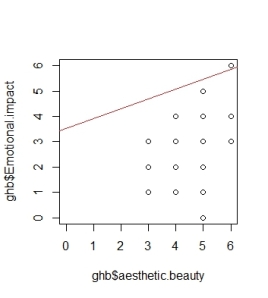Bodiam data again
Yesterday, I said that I expected to see a strong negative correlation between “I didn’t learn very much new today” and “I learned about what Bodiam Castle was like in the past.” In fact, when I ran the correlation function in R, it came out at a rather miserly 0.33, much lower than I expected. So I asked R to draw me a scatterplot:
And there it is, some correlation, but not as much as I was expecting. (I added text labels to each datapoint, with row numbers on, as a quick and dirty way to see roughly where a single point represents more than one respondent.) I think this demonstrates two things. The first is that Likert scales can look awfully “categorical” when compared with true continuous numerical values. And the second is that I need a larger sample (if only to lessen the influence of outliers such as row 1, up the in the top right hand corner, which I fear maybe my own inputting error on the the first interview).
So rather than faff around with individual pairings, I created a correlation matrix of all the seven point Likert scale questions. Other than the learning questions I mentioned in my last post, I used the Likert agreement scale for the following statements:
- My sense of being in Bodiam Castle was stronger than my sense of being in the rest of the world
- Bodiam Castle is an impressive sight
- I was overwhelmed with the aesthetic/beauty aspect of Bodiam Castle
- The visit had a real emotional impact on me
- It was a great story
- During my visit I remained aware of tasks and chores I have back at home/work
- I enjoyed talking about Bodiam Castle with the others in my group
- Bodiam Castle is beautiful
- I wish I lived here when Bodiam Castle was at its prime, and
- I enjoyed chatting with the staff and volunteers here
Looking through the results matrix, the strongest correlation that stands out (at 0.65) is between “It was a great story” and ”I learned about what Bodiam Castle was like in the past.” Which is nice. But remember, correlation ≠causation. Here, I wouldn’t even know where to start, did they admit to learning because the story was great? Or was the story great because they learned about it? And of course neither distribution can be called “normal.” The “correlation” is helped by the skew in both distributions of course.
There’s also an interesting strong correlation(0.57) between “I enjoyed talking about Bodiam Castle with the others in my group” and “I learned about what Bodiam Castle was like in the past.” Though I’m not suggesting cause and effect here, I’d like to follow up on this.
Similarly, there are correlations between the responses which agreed that Bodiam had a great story, and those who enjoyed chatting within their group as well as with staff.
What about the lowest in the matrix? Rather scarily, there seems to be zero correlation between the “Didn’t learn anything new” statement and emotional impact. I’ve already told you about my caveats over emotional impact as something you can measure this way anyway, but zero correlation (when rounded to two decimal places) sets alarm bells ringing about one of these arrays.
Anther correlation from the matrix is between “My sense of being in Bodiam Castle was stronger than my sense of being in the rest of the world” and “During my visit I remained aware of tasks and chores I have back at home/work”, which I guess could/should be expected. It does raise an interest question for the future though. If I had to chose just one of these statements to include in a future survey, which would it be? Based on these Histograms, I might chose the former, if only because it looks more “normal”:
Its also interesting that, “Bodiam Castle is an impressive sight” correlates strongly with “Bodiam Castle is beautiful”(0.54) but less strongly with “I was overwhelmed with the aesthetic/beauty aspect of Bodiam Castle” (only 0.37). Those last two correlate strongly (0.55) with each other, of course.
The “I wish I lived here when Bodiam Castle was at its prime” and “What I learned on the visit challenged what I thought I knew about medieval life,” statements didn’t yield anything particularly interesting. I might drop them from the next survey. But what troubles me most, in an existential way, is the correlation between “I was overwhelmed with the aesthetic/beauty aspect of Bodiam Castle” and “The visit had a real emotional impact on me”.
My whole career has been build around the idea that people want to know stuff, to learn things about places of significance. While its nice that aesthetics and emotions are closely bound, is there any space for the work I do?

